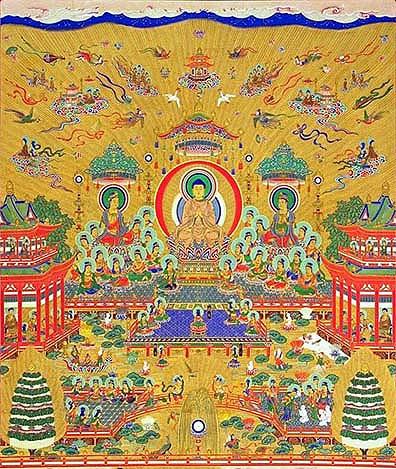
The Nature of the Land of Bliss
Two Kinds of Nature As a Pure Land, the nature of the Land of Bliss is pure in every sense of the word. As declared by
The aim of Pure Land teaching is rebirth in Amitabha Buddha’s Land of Bliss, and the method to attain rebirth is recitation of Amitabha’s Name, as said by Shakyamuni Buddha. Is it the teaching of Shakyamuni or Amitabha, or both? What are the similarities and differences between the two teachings in Pure Land Buddhism? Lots of doubts and confusion? Better clarify it because it involves the Buddha’s original intent of appearing in the world to deliver us for attaining perfect Enlightenment and ultimate liberation.

Two Kinds of Nature As a Pure Land, the nature of the Land of Bliss is pure in every sense of the word. As declared by

What is the difference between Heaven and a Buddha’s Pure Land? This is a question that has vexed outsiders and beginners to Pure Land Buddhism.

The title of my article was posed as a question in the Commentary of the Contemplation Sutra, written by Master Shandao, the de facto founder of

In the Infinite Life Sutra, one of the main texts of the Pure Land tradition, Amitabha Buddha made his 18th vow: “If, when I attain Buddhahood,

In the last three articles in my column, we’ve been discussing a lot about Amitabha-recitation “by ten times”. There are actually two “discrepancies” between the

Rebirth by Amitabha-recitation in 10 times Master Tanluan (476??542 CE), a prominent patriarch in Pure Land Buddhism, interpreted ‘reciting Amitabha ten times’ with an analytical set

Many within Buddhism itself criticize the concept of ‘other-power’ (?L?O) or Buddha power, asserting that it is over-emphasized in Pure Land Buddhism. They might say,

Why “Even only ten times”? Many Buddhist practitioners find the 18th Vow of Amitabha Buddha – the Primal Vow that guarantees salvation to every being that

In this three-part series, Pure Land columnist Alan Kwan examines the three most important vows of Amitabha Buddha’s forty-eight vows, which constitute Amitabha’s plan for

In this three-part series, Pure Land columnist Alan Kwan examines the three most important vows of Amitabha Buddha’s forty-eight vows, which constitute Amitabha’s plan for

In this three-part series, Pure Land columnist Alan Kwan examines the three most important vows of Amitabha Buddha’s forty-eight vows, which constitute Amitabha’s plan for

Remarks in the Commentary of the Contemplation Sutra Soon after Master Shandao defined exclusive practice and mixed practice in his Commentary of the Contemplation Sutra, he told